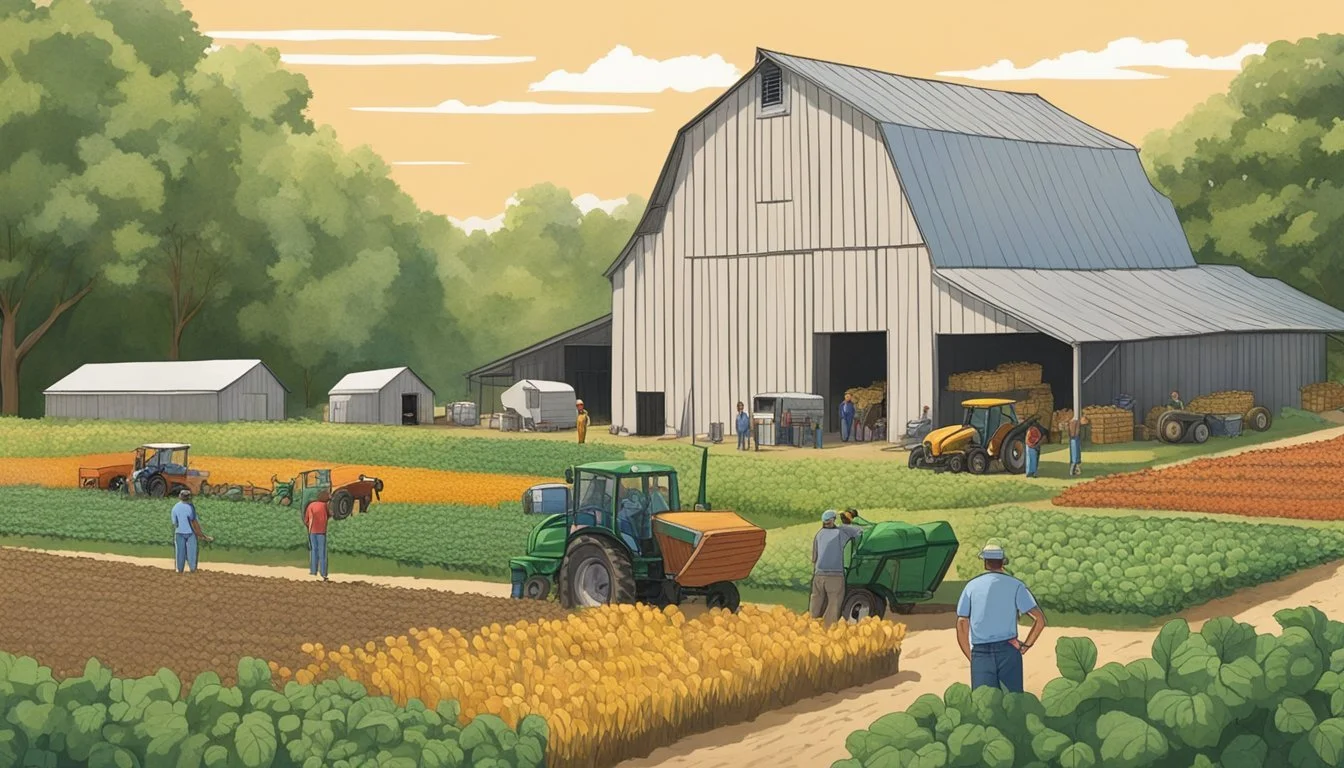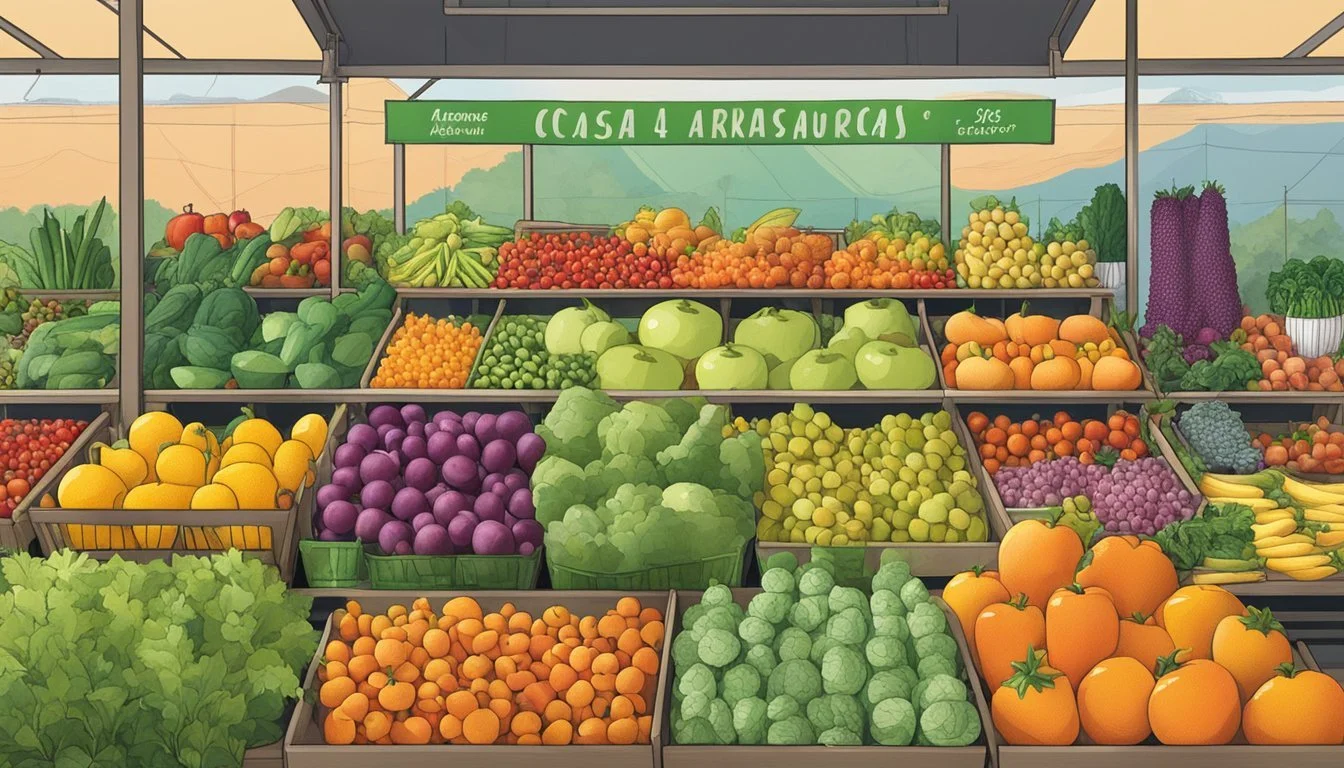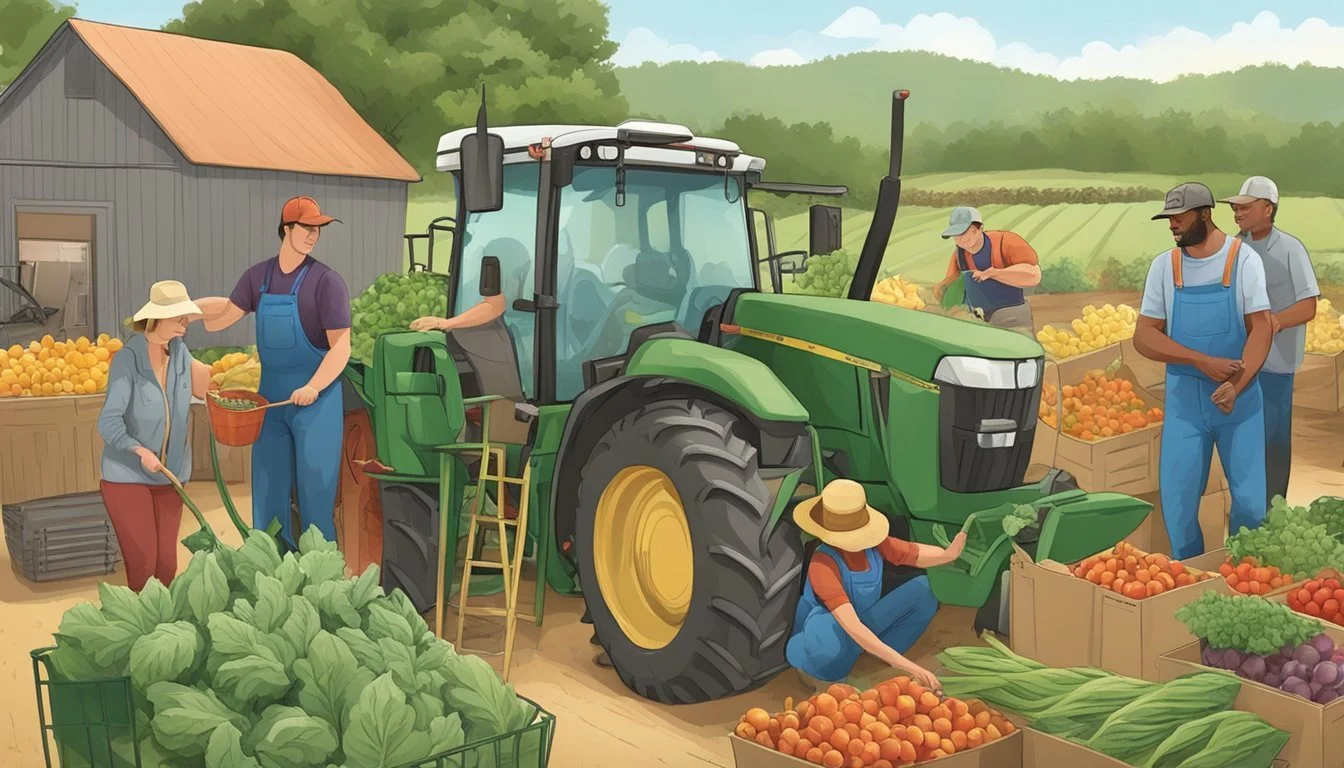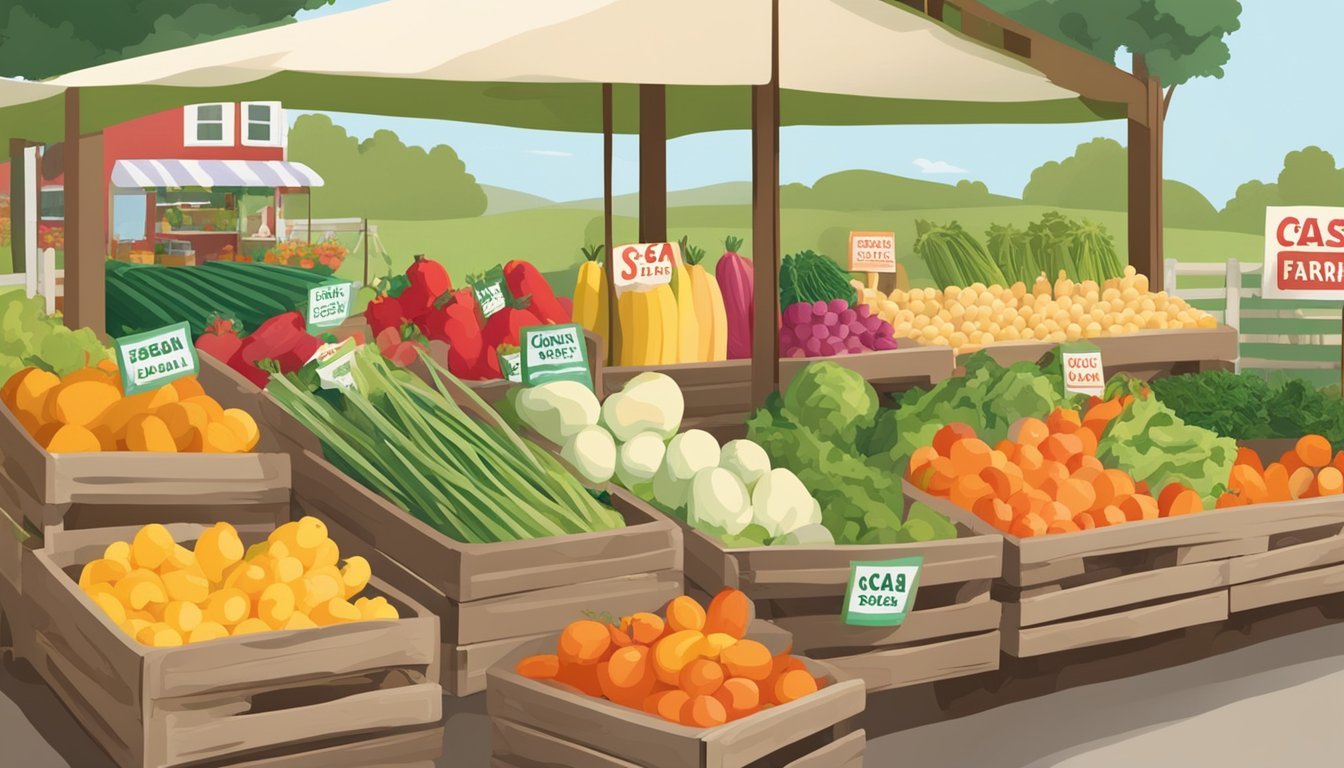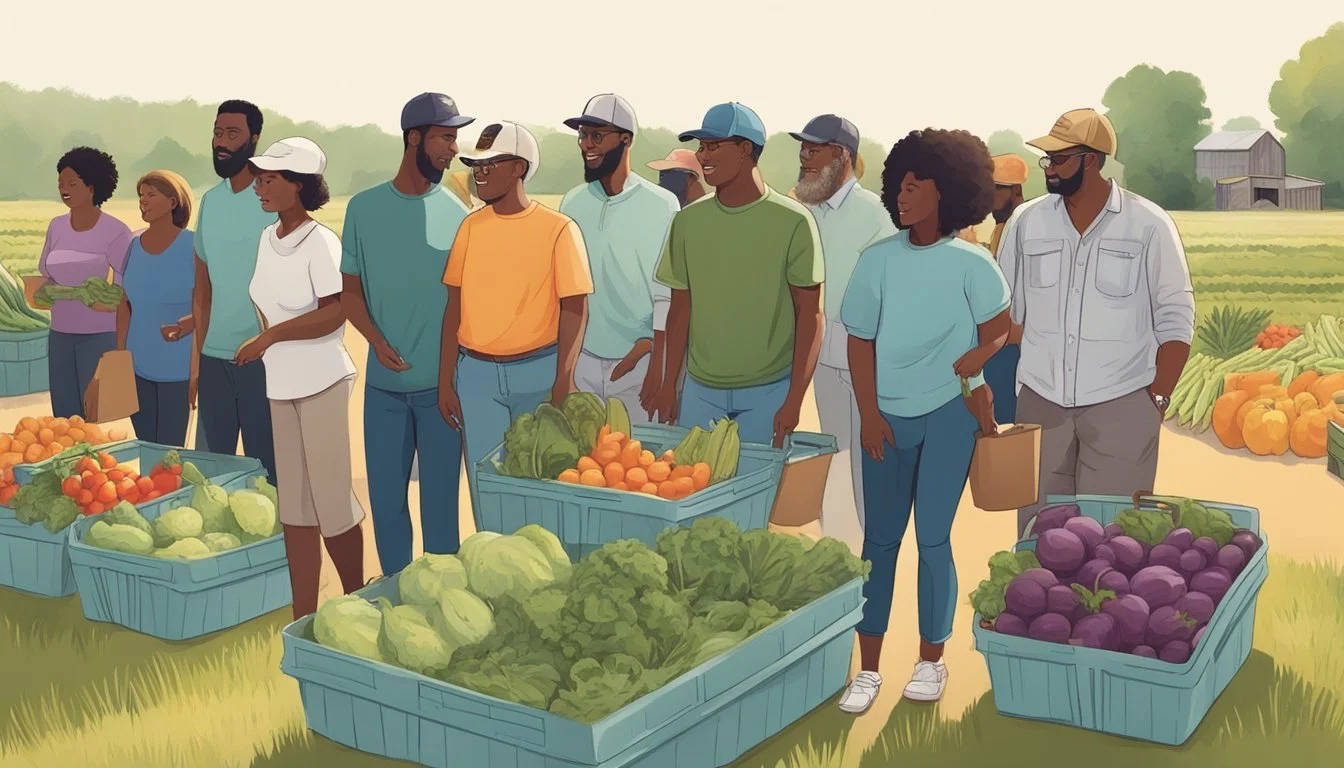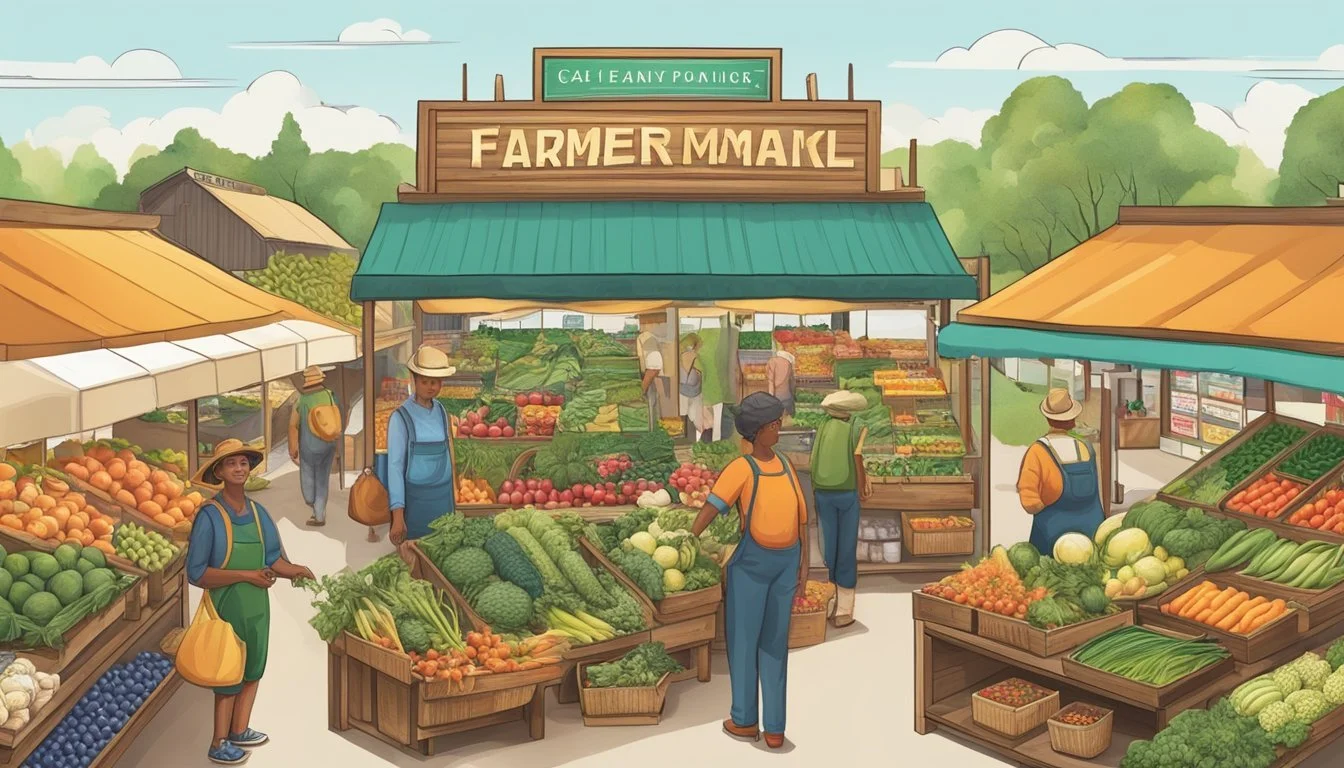Community Supported Agriculture (CSA) in Arkansas
A Guide to Local Farm Partnerships
Community Supported Agriculture, commonly known as CSA, has established a strong presence in Arkansas as a means for consumers to buy local, seasonal food directly from a farmer. In this mutually beneficial model, members purchase a "share" of produce from local farms, thereby becoming vested stakeholders in the agricultural output of their community. Throughout the harvest season, they receive regular distributions of fresh farm products, fostering a connection between consumers and growers, and ensuring the financial security for the participating farms.
Arkansas boasts a variety of CSA programs that cater to the preferences of different communities. Some CSA farms operate on an individual basis, while others like Foodshed Farms function as a cooperative of local, organic, and naturally grown farms. These arrangements not only support the livelihood of Arkansas farmers but also provide a platform for consumers to experience a diverse array of produce cultivated within their region. Through CSA programs, Arkansans have unique access to fresh, high-quality foods while contributing to a sustainable local food system.
The Basics of CSA
Community Supported Agriculture (CSA) connects local farmers directly with consumers, who subscribe to receive a share of the farm's harvest. This model fosters a symbiotic relationship between the community and agriculture by sharing the risks and benefits of food production.
Historical Background
Community Supported Agriculture has been a key part of the local food movement for over 25 years. Its origins in the United States are often traced back to 1986, with the establishment of Indian Line CSA and Temple-Wilton Community Farm by European settlers. While these weren’t the first CSAs in the country, they significantly contributed to the CSA concept's growth in popularity across America, including Arkansas.
Core Principles
The foundational principle of CSA is the establishment of a preseason financial relationship between consumers and local farms. Members of the community invest in the farm's production costs early in the season, which in return provides them with a steady supply of seasonal produce. This model is designed to:
Enhance the direct connection between consumers and the source of their food
Allow farmers to forecast demand and fund operations upfront
Distribute the risks of farming amongst both the producer and the consumer
How a CSA Works
Consumers become members of a CSA through a subscription, paying an agreed amount at the start of the growing season. This can be a lump sum or in installments. They then receive a portion of the farm's harvest, typically on a weekly basis. A share might include:
Vegetables: A box with a variety of seasonal produce
Other Farm Products: Eggs, dairy, meats, or fruits may also be included, depending on the CSA
The cost generally ranges between $400-$700 annually, based on factors like farm operation size, share type, and length of the subscription. Consumers may also pick up their shares at designated locations or receive home deliveries where available.
Benefits of Joining a CSA
When individuals join a Community Supported Agriculture (CSA) program in Arkansas, they foster an enriching partnership with local farmers, gain access to nutrient-rich produce, and contribute to the sustainability of their environment.
Support for Local Farmers
Joining a CSA provides critical support to local farmers, ensuring they receive upfront capital for their seasonal operations. This model stabilizes the farmer's income and mitigates the financial risks associated with crop failure. Participants in CSAs become integral to the prosperity of farms, securing the future of agriculture in Arkansas.
Access to Fresh Produce
Members of a CSA benefit directly by receiving weekly or bi-weekly shares of fresh, locally-sourced produce. This arrangement guarantees a supply of seasonal fruits and vegetables that often surpasses the variety and quality found in traditional retail settings. In Arkansas, local food directories can assist individuals in locating nearby CSA programs to join.
Environmental Advantages
By participating in a CSA, consumers contribute to environmental conservation efforts. Sustainable farming practices, typically employed by CSA programs, minimize the ecological footprint by reducing the need for long-distance transportation and large-scale industrial farming. The local nature of CSAs in Arkansas also means fresher food on tables with less packaging waste and lower carbon emissions.
Community Supported Agriculture embodies an investment in environmental health, fresh produce, and the resilience of local farming.
Types of CSA Programs in Arkansas
In Arkansas, Community Supported Agriculture programs are diverse, catering to a variety of preferences and supporting local farmers through different models of operation.
Traditional Share-Based Programs
Traditional share-based CSAs are structured around seasonal shares offered by local farmers. Customers pay in advance for a season's worth of farm products, which, in turn, offers financial security to farmers for their crop production cycle. The shares typically consist of a box of vegetables, but may also include fruits, herbs, and other farm products. Foodshed Farms, operating as a farmer-owned cooperative in Little Rock, exemplifies this model, with a focus on connecting consumers to Certified Organic and Certified Naturally Grown farm harvests in Arkansas.
Market-Style CSAs
Market-style CSAs provide members with more flexibility compared to the traditional model. Participants receive credits which they can use at participating local farmers' market stands or farm stores across Arkansas. This system allows for personal selection of the farm products they receive, depending on availability and their own preferences. It bridges the gap between the structured nature of a CSA and the desire for choice in the selection of produce.
CSA Subscriptions for Specialty Products
CSA subscriptions for specialty products are increasingly popular, highlighting unique offerings from specific Arkansas farmers. These subscriptions often focus on a particular type of product such as organic meats, artisan cheeses, or heirloom produce. Unlike traditional CSAs that provide a wide range of farm products, these specialty subscriptions allow consumers to support local farmers while enjoying high-quality, niche products.
Starting a CSA Farm
Community Supported Agriculture (CSA) allows farmers to connect directly with consumers, providing them with fresh seasonal produce. In Arkansas, starting a CSA involves careful planning and relationship building.
Setting Up the Business Model
A farmer must define the CSA’s business model, which typically revolves around membership or subscription-based systems. Potential members purchase shares of the farm's anticipated harvest, providing upfront capital for the farmer. In return, members receive weekly or bi-weekly boxes of fresh produce and other farm products throughout the farming season. This model creates a financial foundation and aligns customer expectations with production capabilities.
Land Acquisition and Preparation
Acquiring suitable land is a pivotal step in launching a CSA. The land must have viable soil for the crops intended to be grown and be accessible to members for easy distribution of produce. Preparation involves testing and amending the soil, organizing crop rotations, and setting up necessary infrastructure, such as irrigation systems and greenhouses, to extend the growing season. The land should support a diverse range of crops to meet member expectations.
Building Customer Relationships
The success of a CSA is largely dependent on the farmer's ability to foster strong relationships with customers. This includes engaging with the local community, effectively communicating the benefits of CSA membership, and building trust by demonstrating commitment to sustainable agricultural practices. Farmers can utilize tools like social media, newsletters, and local events to maintain open lines of communication, share stories about the farm’s progress, and encourage word-of-mouth marketing among community members.
Challenges and Solutions
Community Supported Agriculture (CSA) in Arkansas is a cooperative relationship between farmers and consumers; however, it faces its own set of challenges which demand effective solutions. In addressing these challenges, CSA often focuses on three critical aspects: managing seasonal variabilities, mitigating financial risks through shared responsibility, and enhancing marketing and customer retention strategies.
Managing Seasonal Variabilities
In Arkansas, CSAs must contend with the variability of seasons, which can greatly impact farm output. To mitigate this, farmers often diversify their crop selections to ensure a steady supply against fluctuating weather conditions. They also adjust planting schedules and employ protective measures like greenhouses to extend growing seasons.
Financial Risks and Shared Responsibility
The shared risk model is fundamental to CSA, as consumers typically provide payment upfront before the harvest season. This financial structure supports the farm's operational costs early but also means that consumers share in the potential risk of lower yields. To balance this, clear communication about the risks involved and the establishment of a contingency fund can be essential to maintain trust and manage expectations.
Marketing and Customer Retention
In CSA, consistent sales and loyal customer bases are vital. Effective marketing efforts, often via digital channels like LocalHarvest, help CSA programs in Arkansas to connect with a broader audience. Additionally, providing flexible payment options and fostering a strong community around the CSA can increase retention by directly engaging consumers in the life of the farm.
Consumer Guide to Choosing a CSA
When selecting a Community Supported Agriculture (CSA) program in Arkansas, a consumer should consider the range of offerings, logistics around payment and pick-up, and the farming practices employed.
Understanding CSA Offerings
A CSA program may offer a diverse range of vegetables, flowers, eggs, and meat. Consumers should review the seasonal produce calendar for Arkansas to ensure the CSA's offerings align with their expectations. It's crucial to determine the variety and quantity of products provided. Some CSAs specialize in a particular type of produce, such as heirloom vegetables or certified organic options, while others may provide a wider selection including artisanal cheeses or homemade bread.
Sample Offerings:
Vegetables: A mix of seasonal produce, often including tomatoes, peppers, and leafy greens.
Flowers: Bouquets are available with some shares, adding aesthetic value.
Eggs: Fresh, often free-range eggs, sometimes offered as an add-on.
Meat: Availability of pasture-raised meat varies; may include poultry, beef, or pork.
Payment and Pick-up Logistics
Prospective CSA members need clarity on the payment schedule and pick-up details. CSAs typically require upfront payment, which can be a lump sum or installments. This financial commitment supports the farm's operation at the onset of the growing season. The pick-up locations and times vary; some farms offer onsite pick-up, while others may have multiple drop-off points in nearby towns. Understanding these details before committing is vital to ensure they fit the consumer’s schedule and location.
Payment Options:
Upfront: Full payment before the season starts.
Installments: Divided payments over a predefined period.
Pick-up Points:
Onsite: At the farm itself.
Local markets: In neighborhood farmers' markets.
Designated spots: In community centers or other agreed-upon locations.
Evaluating Farm Practices
A consumer may want to consider the environmental and ethical implications of the farming practices. Farms may be certified organic or certified naturally grown, a similar peer-reviewed certification that some smaller farms opt for due to its affordability and grassroots approach. The practices might include crop rotation, composting, and humane animal treatment. Inquiring about these practices can offer insight into how the food is produced and the farm’s dedication to sustainability and quality.
Farm Practice Certifications:
Certified Organic: Complies with national organic standards.
Certified Naturally Grown: Adheres to standards similar to organic but verified by peer-review rather than government.
By assessing the CSA's offerings, payment and pick-up logistics, and farm practices, consumers can make informed decisions aligning with their dietary preferences and values.
CSA Membership: Rights and Responsibilities
Community Supported Agriculture (CSA) in Arkansas follows a model where members support their local farms with advance payment and in turn, receive shares of fresh produce. The arrangement establishes a mutual relationship that entails specific commitments and offers a set of benefits balanced by certain limitations.
Member Commitments
Members are typically required to:
Make an Advance Payment: This upfront cost covers part of the season's production expenses.
Understand the Risks: They share in the risk of farming, which includes poor harvests due to unfavorable weather or pests.
Benefits and Limitations
Members can enjoy:
Fresh Produce: Members receive a regular supply of fresh vegetables and, often, fruit, reflecting what is in season.
Direct Farm Connection: The model provides a direct link to the farm where their food is grown.
However, members should be aware of limitations such as:
Variability: The nature and quantity of produce depend on seasonal success and may vary.
Pick-Up Commitment: Members must commit to a pick-up schedule to receive their shares.
CSA Impact on Local Communities
Community Supported Agriculture in Arkansas provides substantial support to local economies and communities. The model fosters direct relationships between producers and consumers, influencing economic stability, community cohesion, and educational growth in agriculture.
Economic Contributions
Arkansas's local CSAs have been instrumental in reinforcing the financial backbone of rural areas. They allow farmers to receive upfront capital at the start of the planting season, which aids in stabilizing farm income and reduces the financial risks associated with crop failure. Consumer spending at local CSA programs helps to keep money within the community, bolstering local economies. Moreover, when combined with farmers markets and agritourism, CSA contributes to a diversified income stream for farmers and rural entrepreneurs.
Economic Factor Impact on Local Economy Direct Sales Increases farmer revenue and reduces overhead Employment Creates jobs within the community Local Investment Encourages retention of funds in local area Agritourism Attracts additional revenue streams
Social Capital and Community Building
Community Supported Agriculture cultivates social bonds by connecting individuals directly with their food sources. It encourages community members to invest in local CSAs, which often operate alongside farmers markets, creating spaces for social interaction and engagement. These areas become focal points for community gatherings, fostering relationships among residents and between consumers and farmers. The shared appreciation for local produce and transparent farming practices strengthens community ties and establishes trust.
Networking: CSA members often interact, sharing recipes and knowledge about local foods.
Community Support: Local CSA programs support food security and can provide food to those in need.
Educational Opportunities
Arkansas's CSAs serve as educational platforms, offering consumers and local residents insights into the process of food production. They raise awareness about the importance of sustainable farming and healthy eating habits. Moreover, many CSA farms host school groups and offer tours, which enhancethe understanding of agriculture and local food systems among students of all ages.
Workshops and Tours: CSA operations provide hands-on learning experiences.
Consumer Education: Highlights the benefits of fresh, locally-grown produce versus store-bought alternatives.
CSA Directory and Resources
Community Supported Agriculture in Arkansas offers a bridge between fresh, local produce and the residents who value food sustainability and supporting local farmers. This section details key directories and resources essential for connecting individuals to CSAs across the state.
Finding a CSA Near You
Residents of Arkansas can locate a CSA by utilizing an online CSA directory that provides comprehensive listings. These directories typically allow users to search by zip code, making it convenient to find CSA options in their locality. One such platform is LocalHarvest, which is a user-friendly resource that connects people with local CSA providers.
Arkansas CSA Organizations and Networks
Arkansas is home to several CSA organizations such as New South Produce Cooperative and Foodshed Farms. New South Produce Cooperative offers a collaborative approach by combining resources from multiple farms, while Foodshed Farms emphasizes community engagement and sustainable farming practices. Both organizations serve as networks for numerous local farms, providing fresh produce to CSA members across the state.
Educational Materials and Support
To support ongoing learning and development, various CSA farms and organizations offer educational materials ranging from farming best practices to nutritious recipes. The API specifically provided for CSA directories can be utilized by developers to integrate CSA information into apps and websites, furthering outreach and education on CSAs in Arkansas. Additionally, many CSAs host farm visits and workshops, fostering a hands-on understanding of sustainable agriculture.
Spotlight on Arkansas CSAs
Community Supported Agriculture in Arkansas encapsulates a variety of pioneering programs and farms, emphasizing fresh, local produce and support for hard-working farmers in the region. They embody the community spirit and strive to provide the freshest organic or naturally grown fruits and vegetables.
Highlighting Key Farms and Programs
Dripping Springs Garden (Madison County): This establishment offers an array of organic produce, supported by local consumers who appreciate sustainability and quality in their food sources.
Foodshed Farms (Pulaski County): A farmer-owned cooperative, known for a diverse multi-farm CSA, fully dedicated to promoting Certified Organic and Certified Naturally Grown produce from Arkansas.
Cobblestone Project (Pulaski County): The farm stands out with their CSA program named Farm-to-Harvest shares, channeling proceeds to further community efforts.
Whitton Farms: Distinguished for their direct-to-consumer approach in selling produce, Whitton Farms makes local, seasonal food more accessible while ensuring financial support for the agricultural community.
North Pulaski Farms: This farm is known for using environmentally friendly practices to grow their produce, showing Arkansas's commitment to ecological sustainability.
Success Stories
Arkansas's CSA scene is bolstered by narratives of progress and resilience. For instance, Dripping Springs Garden has achieved a loyal following by providing consistently high-quality organic produce to its CSA members, thereby ensuring stable demand for their crops. Similarly, Cobblestone Project has successfully modeled how CSA profits can circle back to the community, demonstrating a sustainable business model that contributes to local prosperity. These narratives are more than just stories; they are testaments to the effectiveness and impact of CSAs in Arkansas, cultivating a promising future for local agriculture.

